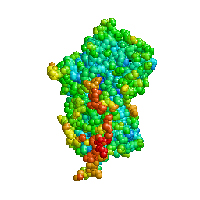Z-alpha1-antitrypsin polymers and small airways disease: a new paradigm in alfa-1 anti-trypsin deficiency-related COPD development?

All claims expressed in this article are solely those of the authors and do not necessarily represent those of their affiliated organizations, or those of the publisher, the editors and the reviewers. Any product that may be evaluated in this article or claim that may be made by its manufacturer is not guaranteed or endorsed by the publisher.
Authors
The presence of Alpha1-Antitrypsin (AAT) polymers, known to promote a sustained pro-inflammatory activity, has been previously demonstrated in bronchial biopsies of subjects with Z-AAT deficiency (AATD) suggesting a possible role in the development of COPD through a small airway disease impairment. The study aimed to assess the presence of small airways dysfunction and the potential correlation with the presence of Z-AAT polymers obtained by Exhaled Breath Condensate (EBC) collection in PiZZ subjects, as compared with matched healthy PiMM subjects. We enrolled 19 asymptomatic, never smoker subjects: 9 PiZZ and 10 PiMM as controls, without obstructive ventilatory defect (i.e., normal FEV1/VC% ratio). All subjects underwent complete pulmonary function tests (PFT). EBC was collected in all subjects. ELISA test was applied to search for Z-AAT polymers. The PiZZ subjects showed normal lung volumes and DLCO values. However, in comparison with PiMM subjects, the single breath test N2 wash-out revealed significant differences regarding the phase III slope (1.45±0.35 N2/L vs. 0.96±0.40 N2/L) (p<0.02) in the PiZZ subjects, while the closing volume/vital capacity ratio (14.3±4.5 % vs. 11.3±6.3 %) was not significantly increased. The ELISA test detected the presence of Z-AAT polymers in 44% of PiZZ patients. Asymptomatic, never smoker PiZZ subjects with normal spirometry and lung diffusion capacity showed airways impairment when compared to PiMM subjects. Although Z-AAT polymers were found only in 44% of PiZZ subjects, these findings suggest the possibility that chronic bronchiolitis can develop as a result of the long-term pro-inflammatory activity of Z-AAT polymers in subjects with Z-related AATD.
Supporting Agencies
University of BresciaHow to Cite

This work is licensed under a Creative Commons Attribution-NonCommercial 4.0 International License.







